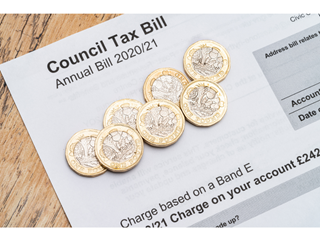
With council tax increasing for most homes, could you qualify for a refund?
Many households will see an increase in what they owe to HMRC this tax year. Some higher rate earners are now classified as additional rate taxpayers, while some businesses will see an increase to their corporation tax bill.
Another change to note is the potential rise in council tax bills this year.
Council tax is a charge on domestic properties in Britain. It is levied by your local council and used to fund services in your area like rubbish collection and road maintenance.
You’ll usually pay council tax regardless of whether you’re a property owner or a renter, and your rates will be set by your local council – not the Government.
The council’s influence over your bill will ultimately depend on your country of residency. In England, local councils were allowed to increase their council tax rates by up to 5% for this tax year.
Most councils opted to make this maximum increase, according to the County Councils Network (CCN).
Similarly, in Wales councils have the freedom to set their own rates but the Government can restrict certain rises it deems “excessive”. This means some councils, like Conwy, have increased their council tax rates by 9.9% - more than the 5% cap in England.
Meanwhile, in Scotland councils have full autonomy over how council tax rates are set. This year most councils will increase their council tax rates by 3%.
In Northern Ireland you’ll pay district and regional rates instead of council tax. Your district rate is determined by property’s worth, while the regional rate is usually set by the Northern Ireland Assembly.
Not sure how else you’ll be affected by the new tax laws this year? Read our latest news article.
By calculating the value of your property at a certain time, your property will fall into a band. This is important, because these bands are used in England, Wales and Scotland to determine your council tax.
In England, for example, if your home would have been sold for less than £40,000 in April 1991 then your band will be A. This is the cheapest band and means you’ll pay the lowest council tax in your area.
Bands go up alphabetically to the letter H in England and Scotland and the letter I for Welsh residences.
Before paying your council tax at the end of the month it is worth checking if you qualify for a discount. If you are eligible for a council tax refund then you must apply for it via your local council.
One of the most common council tax refunds available applies to adults living alone. Whether you’re a widower, bachelor, or single parent living with children under the age of 18 you could be eligible for a 25% discount on your council tax bill.
According to the Government, the average council tax bill per dwelling in the UK is £1,578 a year. With the 25% discount, this could save the typical home nearly £395 in this period.
This discount also extends to adults who live with a person who is “severely mentally impaired”, according to a document set out by the House of Commons.
If you are living with someone classed as “severely mentally impaired” then you could get more than 25% off your council tax.
If you are a full-time carer living with someone facing these difficulties then you could be eligible for 50% off your council tax bill. However, this only applies if no other eligible adults live in the property.
Based on the average council tax bill for the year, this 50% discount works out to saving nearly £790 a year.
Students are exempt and don’t pay council tax. This only applies to households where all members are students.
So, if you’re still living with your parents or have a roommate who isn’t studying then you’ll still get a council tax bill.
Council tax refunds mostly apply to pensioners who are already seeking help from the State.
For example, those already using pension credit or with less than £16,000 in their savings could negate any council tax charges.
Finally, if you own a second home, like a holiday home, you could make use of a council tax discount. This will be at the discretion of your local council.
Information is correct as of the date of publication (shown at the top of this article). Any products featured may be withdrawn by their provider or changed at any time. Links to third parties on this page are paid for by the third party. You can find out more about the individual products by visiting their site. Moneyfactscompare.co.uk will receive a small payment if you use their services after you click through to their site. All information is subject to change without notice. Please check all terms before making any decisions. This information is intended solely to provide guidance and is not financial advice. Moneyfacts will not be liable for any loss arising from your use or reliance on this information. If you are in any doubt, Moneyfacts recommends you obtain independent financial advice.